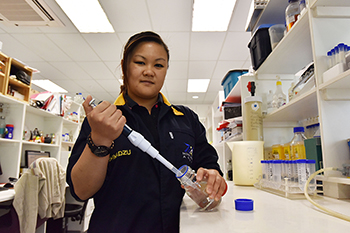Latest News Archive
Please select Category, Year, and then Month to display items
03 March 2021
|
Story Giselle Baillie
|
Photo Supplied
_web.jpg?sfvrsn=987e6620_1) Residence members who led the project, included:
Bohlokwa Rantja, the Residence Prime, and Transformation Committee members Nsuku Mutemela, Ofentse Motlakeng, Phindile Tjale, Madinku Mabala, Mmapopi Motshoso, Karabo Shuping, and Tagane Sekete.
Residence members who led the project, included:
Bohlokwa Rantja, the Residence Prime, and Transformation Committee members Nsuku Mutemela, Ofentse Motlakeng, Phindile Tjale, Madinku Mabala, Mmapopi Motshoso, Karabo Shuping, and Tagane Sekete.
The University of the Free State (UFS) Council approved and adopted Lehakwe House as the new name for the
NJ van der Merwe residence on the Bloemfontein Campus. The approval on 26 November 2020 followed a lengthy process of deliberation, consultation, and public engagement that has taken place since November 2019 and is aligned with the UFS Policy on Naming and Renaming. The name-change process was initiated by the Prime and Transformation Committee of the residence, guided by the
Unit for Institutional Change and Social Justice and supported by a multi-stakeholder committee representative of the residence, the Housing and Residence Affairs Office, the Department of Student Affairs, the Student Representative Council, and alumni.
Lehakwe – a precious gem
Following a lengthy evaluation process of the names submitted through a public voting and recommendation platform in July 2020, ‘Lehakwe’ – a Sesotho word referring to a ‘precious gem’ – emerged as the front runner. As many current and past members of the residence attest, this womxn’s residence has come to occupy a significant space within the hearts and minds of UFS students and the UFS community, given that its spirit has always been closely aligned with the constitutional values of dignity, equality, and freedom and with the human values of ubuntu. In this vein, the new name of ‘Lehakwe’ presents a consolidation of constitutional and university values into the day-to-day thinking, learning, living, and legacy spaces of students, as well as everyone who interacts and engages with the UFS.
The impact of personal care products on water resources in the Free State
2015-12-14

Jou-an Chen
Photo: Charl Devenish
|
Water is of the utmost importance in personal hygiene. Most people can hardly have a day go by without taking a shower in the morning and at night. However, it is this very habit that is increasingly polluting the water resources in South Africa.
Contaminants found in pharmaceutical and personal care products have been accumulating in water masses in recent years. These contaminants especially refer to hormones in medication, as well as colouring agents and fragrances used in soap, shampoo and body lotions.
“Little information and data are available on the prevalence of these contaminants, and on how high the level of pollution really is,” says Jou-an Chen, researcher in the Department of Microbial, Biochemical and Food Biotechnology at the UFS.
Her research particularly focuses on the prevalence and impact of those contaminants.
“Because these substances have not been properly investigated, we are not sure how widely it occurs and whether it is harmful to the environment. It was precisely the lack of information that has inspired me to investigate further.”
“If we could identify the contaminants and what it is doing to the environment, it could make a valuable contribution to directives on water quality standards.”